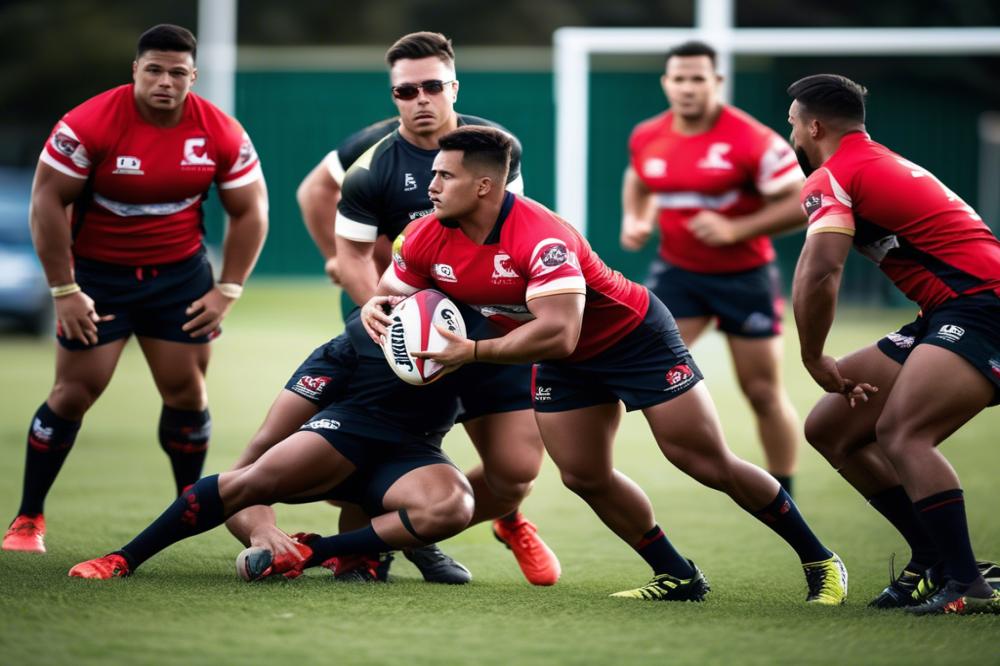Behind the Scenes: Training and Preparation at the Dragons
The St George Dragons Rugby League Club has a rich history and a committed fan base. Established in 1920, this team has carved out a significant place in the world of rugby league. With numerous premierships to their name, their legacy is one of excellence and hard work. Understanding the club is essential to appreciating the level of commitment known as Dragons Training.
Training and Preparation play a pivotal role in any sport, but rugby league demands a unique blend of physical and mental skills. This sport is not just about strength; it requires strategic thinking and flawless teamwork. Players need to master complex plays while maintaining peak physical condition. The importance of training cannot be overstated.
Every day at the facility, players engage in a rigorous training regimen. Coaches guide them through intense practice drills that focus on player development and honing their skills. Strategy sessions are an integral part of their routine, allowing players to collaborate and sharpen their game plans. The coaching staff works closely with athletes to foster team dynamics. Such cooperation builds trust and ensures efficient communication on the field.
Physical conditioning is critical. Players push their limits to develop mental toughness, essential for overcoming the many challenges they face during a season. Performance analysis helps identify strengths and weaknesses, leading to tailored training approaches. Strong emphasis on teamwork ensures that no player is left behind, cultivating a cohesive unit that can perform under pressure.
In summary, the behind-the-scenes work at St George Dragons showcases a commitment to excellence. Their strategic approach to training and preparation exemplifies what it takes to succeed in rugby league. As they continue to push forward, the hard work and dedication of every player and coach will undoubtedly shape their future successes.
The Dragons Training Philosophy

The core values of the club revolve around respect, integrity, and commitment. These principles guide every aspect of the training regimen. Players learn that success comes not just from individual skill but from a collective effort. Each athlete is encouraged to embrace these ideals as part of their journey.
Teamwork plays a vital role in shaping the dynamics of the group. When each member collaborates, the team becomes stronger. The emphasis on cooperation fosters trust among players. Trust has a critical role in executing complex strategies on the field. Frequent practice drills help athletes learn to depend on one another.
The coaching staff believes that integrating mental toughness into practice is essential. Overcoming obstacles during training builds resilience. Various strategy sessions are held weekly. This time allows players to refine their skills while understanding game tactics better. Performance analysis after each match gives clear feedback for growth and adjustment.
Physical conditioning is also a focal point. Coaches design workouts that not only enhance strength but also improve endurance. Conditioning drills push players to their limits, preparing them for competitive scenarios. As athletes grow stronger, they also develop a deeper appreciation for the hard work that goes into preparation.
Player development takes precedence in every training session. Individual goals are set to help athletes reach their potential. Progress is closely monitored, ensuring that each player is on a path to improvement. A supportive environment encourages everyone to strive for excellence.
Additionally, the coaching staff approaches training with innovation and adaptability. They understand that each athlete is unique and may require tailored guidance. By fostering an inclusive atmosphere, the Dragons empower players to express their strengths while working on areas for improvement. This methodology helps create a well-rounded team ready for any challenge.
Coaching Staff and Their Contributions

The coaching staff at the Dragons plays a crucial role in shaping both the players and the overall team dynamics. Each member brings their own experience and expertise, helping to build a strong foundation for success. Here are key profiles of those essential coaches.
Profiles of Key Coaching Staff Members
Head Coach Mark Reynolds has been at the helm for several seasons. His focus on player development is unmatched. Mark emphasizes building mental toughness, believing it separates good players from great ones. Assistant Coach Sarah Thompson specializes in physical conditioning. She designs practice drills to promote stamina and strength. Her workouts are intense but effective.
Defensive Coordinator Jake Lewis is known for his strategic mind. He leads strategy sessions and focuses on analyzing opponents’ weaknesses. His ability to read the game is impressive and he shares this insight with the team. Offensive Coordinator Lisa Chang brings creativity to the practices. She develops unique plays tailored to the players’ skills.
Roles of Each Coach in Player Development and Team Performance
Every coach at the Dragons has a distinct role. The head coach oversees the entire training regimen while driving the team’s vision. Assistant coaches support players individually, ensuring that personal growth is a priority. Jake, for example, works closely with defenders to refine their techniques and improve performance analysis.
Lisa spends extra time on offensive strategies, helping players connect and work as a cohesive unit. Teamwork is essential for success, and her approach encourages collaboration. Sarah’s sessions focus on building overall fitness. Conditioning is vital, especially during the intense parts of the season.
Coaching Strategies and Communication Techniques Used During Training
Coaching strategies are as varied as the personalities of the staff. Frequent communication is key. Each coach conducts daily check-ins to understand player concerns and strengths. That openness builds trust and keeps the lines clear.
During training, practice drills are structured to reflect real-game scenarios. This approach allows players to apply strategies in a controlled environment. Mark often uses video analysis, helping players visualize their movements and make adjustments. Feedback is immediate, paving the way for quicker growth.
Injuries can be a challenge. Coaches discuss injuries openly, keeping athletes informed about recovery. Mental resilience is tested regularly through both challenging drills and motivational talks. This combination not only sharpens physical skills but also boosts overall confidence.
Training Regimen: Structure and Components

At the heart of the Dragons’ success lies a rigorous training regimen. Daily and weekly schedules are carefully crafted to optimize player development. Each day begins with warm-up exercises to prepare for physical activity. Following this, players often engage in a mix of strategy sessions, practice drills, and conditioning workouts. Coaches play a crucial role in this structure, providing guidance as well as motivation.
A typical week features varied training activities. On Mondays, focus may shift to offensive strategies. Tuesdays often incorporate defensive drills. Wednesdays generally emphasize teamwork through scrimmages. Each session aims to strengthen the team dynamics that are vital for success on the field. This mix keeps players engaged while allowing them to hone specific skills.
Physical conditioning has become an essential aspect of training. Strength and endurance are built through tailored workouts. These sessions often include weight training, agility drills, and cardiovascular challenges. Coaches understand that physical fitness directly correlates with performance. Additionally, maintaining mental toughness is vital. Players work on resilience through challenging exercises designed to simulate in-game pressure.
Practice drills vary widely to address different aspects of the game. From passing to tackling, each drill targets specific skills. Consistency in these drills allows players to refine their abilities over time. Performance analysis comes into play when reviewing scrimmages and drills. Coaches assess players to identify strengths and areas for improvement. This ongoing feedback is crucial for individual and team growth.
The depth of the training regimen reflects a commitment to player improvement. Every aspect—from physical readiness to strategic understanding—contributes to the overall performance. Coaches continuously adapt to both the needs of the team and the demands of the game. This careful approach allows the entire squad to maximize their potential on the field.
Developing Mental Toughness and Resilience
Coaching staff at the Dragons focuses on enhancing mental toughness. The goal is to create players who can withstand pressure during crucial moments. Strategies to build this resilience include intense practice drills that mimic in-game stress. Coaches often set high expectations to push athletes beyond their limits. Team dynamics play a crucial role here; a supportive environment helps players learn from each other.
Techniques for managing pressure are essential during games. Players participate in strategy sessions where they explore situations that may arise. These discussions equip athletes with the tools needed to perform calmly under stress. Additionally, deep breathing exercises and visualization techniques are part of their routine. Such practices promote a clear mind when tensions run high.
Mental conditioning forms a key aspect of overall player development. Emphasis is placed not just on physical conditioning but on the mental game. Throughout the training regimen, performance analysis helps players identify areas for improvement. Through feedback, athletes can adjust their mindset and approach. This connection between teamwork and individual growth is vital. Each player contributes to the collective strength of the team.
As the players drill their strategies, they develop a stronger mental foundation. The combination of physical training and mental prep prepares them for any challenge they may face on the field. By nurturing this mental toughness, the Dragons cultivate athletes who can rise to any occasion.
Performance Analysis and Strategy Sessions
Video analysis plays a pivotal role in how the Dragons evaluate their games and training sessions. Coaches utilize recorded performances to critique each player’s effort and execution. This process allows the coaching staff to break down plays, providing players with direct feedback on their actions. By watching footage closely, key moments become clear, showing where improvement is needed.
Performance data is collected meticulously to guide coaching decisions. Statistics like running distances, tackle counts, and player efficiency rates are reviewed. This data shapes how training regimens are developed and adjusted. Players receive personalized feedback based on their statistics, promoting targeted player development. Coaches work collaboratively to interpret this information, highlighting areas that need attention.
In strategy sessions, the team discusses how to approach upcoming opponents. Coaches facilitate conversations about tactics and formations, as the input from players is invaluable. Different perspectives foster a deeper understanding of team dynamics, allowing the group to adapt more fluidly to varying game situations. Even during practice drills, strategic elements are woven into the training to prepare everyone for the unexpected.
Teamwork and communication are reinforced throughout all training activities. Physical conditioning is balanced with discussions about mental toughness. Coaches emphasize that resilience is just as crucial as skill. By simulating high-pressure situations in practice, players learn to stay focused and respond effectively when it matters most.
Collaboration during strategy sessions creates a sense of ownership among players. Everyone feels part of the preparation, which boosts morale. This shared commitment ensures that the team steps onto the field with a clear game plan. The blend of analysis, feedback, and strategic thinking shapes how the Dragons excel both on the field and during practice.
Wrapping Up the Training Experience at the Dragons
Comprehensive training at the Dragons plays a crucial role in shaping both the athletes and the team’s future. Attention to detail in drills and strategies cannot be overstated. Each training session is a stepping stone to greater performance, allowing players to hone their skills. This structured approach benefits everyone involved, creating a genuine culture of excellence.
Reflecting on the training practices reveals their direct influence on team success. Improvement in individual skills translates into enhanced team dynamics. Players grow not just in ability but also in confidence. This journey fosters trust among teammates. As they push each other, a sense of unity naturally develops, making the squad stronger overall.
Looking ahead, the Dragons aim to refine their training methods further. The coaching staff is committed to researching new techniques and embracing innovative strategies. Staying ahead of the curve in sports science could provide an edge. The future is bright for this team as they continue to evolve and adapt in their quest for greatness.



